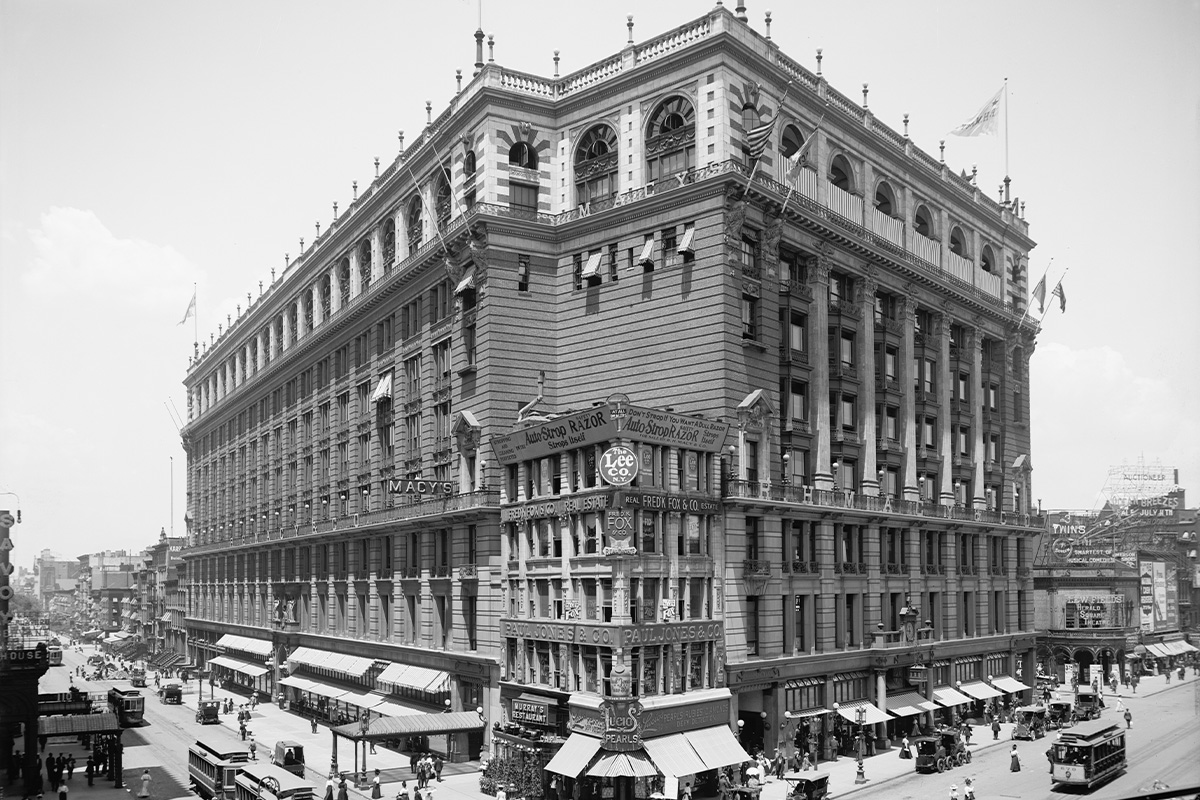Before there was Amazon, there were big-box stores. Before there were big-box stores, there were department stores. And before there were department stores… there were Jews. Yes, while the department store as we know it today is a worldwide phenomenon, from Harrods in England to Takashimaya in Japan, its roots are strongly American — and strongly Jewish.
While many historians believe that the department store as a concept has its roots in 18th-century England, it was the mid-to-late 19th century, and the urban expansion of the Industrial Revolution, that saw an explosion of interest in department stores — with American Jews at the forefront. While the earliest American department stores, including Arnold Constable & Company and the earliest branches of Lord and Taylor and Macy’s, were single-location establishments based in New York and other Northeastern cities, the end of the 19th century brought the department store chain cross-country.
Macy’s was already established as one of the oldest department stores in the United States, at over 40 years old, when the Macy family sold the business in 1895 to German-Jewish immigrants Nathan and Isidor Straus (you may have heard of Isidor in another context — he and his wife Ida perished tragically, and voluntarily in her case at least, on the Titanic). Bloomingdale’s, the other New York department store chain to quickly grow to a national scale, was also founded by a Jewish duo — the father-son team of Benjamin and Lyman Bloomingdale.
Sears has its roots in the traditional department store, but it was co-owner Julius Rosenwald’s innovation that led to Sears-Roebuck shaping America — not through physical stores, but through catalog shopping. Rosenwald introduced the mail-order catalog concept to Sears-Roebuck, which led to a greater accessibility of clothes, household appliances and even houses themselves (some Sears houses are still standing today) across rural America, nearly a century before online shopping. American Jews also made names for themselves in the world of high-end, luxury department stores — from Saks Fifth Avenue to Neiman-Marcus to Bergdorf Goodman, all of which had Jewish founders.
The question is, why? What led so many Jews to build careers around department stores? How did Jewish founders from New York to Kentucky to Illinois find their way into this business?
There’s no one precise answer. The history of American Jews in the garment business is lengthy and well-studied (and as relevant today as ever). But it cannot explain the particular relationship with department stores — which, by definition, are not clothing stores, but sell varied items including cosmetics, cookware and sundries like linens in addition to apparel.
That said, Jewish merchants specializing in a varied assortment of goods had a history in America that spanned far beyond the industrial northeast, and predated the establishment of American department stores for decades — these were the Jewish peddlers that traveled across North and South America as far back as the 18th century. Even the Netflix show “Anne With an E” depicts a Jewish peddler coming to a place as remote as 19th-century Prince Edward Island (and encountering a complicated form of prejudice when he’s mistaken for an Italian).
With a history like that, it would have been easy for American Jews to see the appeal of the department store — both for consumers and for proprietors. After all, the life of a peddler could be not only physically exhausting but profoundly lonely, while running a department store provided the ability to develop friendships, relationships and a community in a single location that your customers would flock to, rather than taking to the road to meet them.
This is also, perhaps, why it’s not a coincidence that Sears-Roebuck’s Jewish co-owner, Julius Rosenberg, was the one to revolutionize catalog shopping. As a Midwestern Jew (he originally came from Illinois) he may have had a particular awareness of the demand for clothing, household goods and the little luxuries that make us smile that existed in rural, remote parts of the United States—places where, for over a century, residents may have only ever met Jewish people when the peddler came to town.
There are those who wonder at the fate of the department store in an age of online shopping. After all, some of the oldest department stores have been shifting to online-first models, like Lord and Taylor did in 2021. But the department store has been around for a long time, and given that Amazon itself has been branching into brick-and-mortar stores, we can hope, and suspect, that it’s not going anywhere anytime soon.



